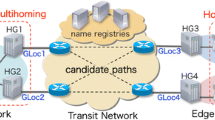Abstract
A proper support for multimedia communications transport has to provide fault tolerance capabilities such as the preservation of established connections in case of failures. While multi-homing addresses this issue, the currently available solution based in massive BGP route injection presents serious scalability limitations, since it contributes to the exponential growth of the BGP table size. Alternative solutions proposed for IPv6 fail to provide equivalent facilities to the current BGP based solution. In this paper we present MEX (Muti-homing through EXtension header) a novel proposal for the provision of IPv6 multi-homing capabilities. MEX preserves overall scalability by storing alternative route information in end-hosts while at the same time reduces packet loss by allowing routers to re-route in-course packets. This behavior is enabled by conveying alternative route information within packets inside a newly defined Extension Header. The resulting system provides fault tolerance capabilities and preserves scalability, while the incurred costs, namely deployment and packet overhead, are only imposed to those that benefit from it. An implementation of the MEX host and router components is also presented.
This research was supported by the SAM (Advanced Mobility Services) project, funded by the Spanish National R&D Programme under contract MCYT TIC2002-04531-C04-03.
Access this chapter
Tax calculation will be finalised at checkout
Purchases are for personal use only
Preview
Unable to display preview. Download preview PDF.
Similar content being viewed by others
References
Huston, G.: Commentary on Inter-Domain Routing in the Internet, RFC 3221 (2001)
Black, B., et al.: Goals for IP Multihoming Architectures, Internet Draft, work-in-progress (2002)
Deering, S.: Internet Protocol, Version 6 Specification, RFC 2460 (December 1998)
Fuller, V., et al.: Classless Inter-Domain Routing (CIDR): An Address Assignment and Aggregation Strategy, RFC 1519 (1993)
Hinden, R., et al.: An IPv6 Aggregatable Global Unicast Address Format, RFC 2374 (1998)
Johnson, D., et al.: Mobility Support in IPv6, Internet Draft-Work-in-progress (2003)
Conta, A., et al.: Internet Control Message Protocol (ICMPv6) for the Internet Protocol Version 6 (IPv6) Specification, RFC 2463 (1998)
Thomson, S., et al.: IPv6 Stateless Address Autoconfiguration, RFC 2462 (1998)
Carpenter, B.: Architectural Principles of the Internet, RFC 1958 (1996)
Hagino, J., et al.: IPv6 Multihoming Support at Site Exit Routers., RFC 3178 (2001)
Huitema, C., et al.: Host-Centric IPv6 Multihoming, Internet Draft-Work-in-progress (2002)
Labovitz, C., et al.: Delayed Internet Routing Convergence, In: ACM SIGCOMM 2000 (2000)
Author information
Authors and Affiliations
Editor information
Editors and Affiliations
Rights and permissions
Copyright information
© 2003 Springer-Verlag Berlin Heidelberg
About this paper
Cite this paper
Bagnulo, M., García-Martínez, A., Soto, I., Azcorra, A., Rodríguez Hervella, J.F. (2003). Preserving Established Communications in IPv6 Multi-homed Sites with MEX. In: Ventre, G., Canonico, R. (eds) Interactive Multimedia on Next Generation Networks. MIPS 2003. Lecture Notes in Computer Science, vol 2899. Springer, Berlin, Heidelberg. https://doi.org/10.1007/978-3-540-40012-7_5
Download citation
DOI: https://doi.org/10.1007/978-3-540-40012-7_5
Publisher Name: Springer, Berlin, Heidelberg
Print ISBN: 978-3-540-20534-0
Online ISBN: 978-3-540-40012-7
eBook Packages: Springer Book Archive




